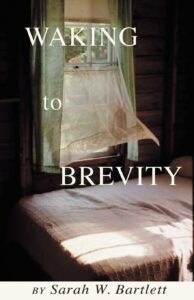 Review by Mindy Kronenberg
Review by Mindy Kronenberg
Waking to Brevity is a testament to love, life, and how the poet and her husband came to terms with the encroachment of his Parkinson’s Disease. Sarah W. Bartlett has created a touching, brave, and ultimately inspiring collection of public and private moments, chronicling a relationship through early romance, building a family, and growing older and dependent. Her poems become a collective meditation on time and the precious aspects of the ephemeral.
It is a most poignant journey, filled with gratitude even as grief settles in, for a shared life of devotion and memories. The poet encapsulates this experience early on in “A Lifetime Together, in Three Short Decades,” (8) with its recitation of celebrations, excursions, rites-of-passage, and the evolution of gestures, imagined plans, and preparation for the inevitable, from “…Instinct/ vs history. Parsing love languages. Late-life mother/with mid-career dad. Steep learning curves ahead.” to “…Mountain cabin summers. Cot-by-the-sea blooming. Surgeries, trust healing.” and “…Gratitude letters, honors; farewells and hospice bills. Love notes. Promises. Forgiveness. Peace.”
The determination to be present, immersed in life’s momentary gifts, is also evident in several poems of profound occasion. In “Priority of Cake” (16) the poet’s husband is “in pain/ from so many falls,/sacrum and spine/bearing the brunt…” as they prepare to welcome a new grandson home. It is a scene of both concern and celebration, and a flurry of activity—“…our grandson’s laughter, romping dogs,/ quick consults with our daughter about meals.”—but despite his discomfort his focus is on the confection being baked for the occasion:
Everything needs attention at once as you
who just asked for help wave your hand,
command check the cake first!
We are witness to a remarkable and tenacious gesture in “Last Rhumba,” (p 19) where the poet’s daughter visits her declining father “To say goodbye, yes. But also/ to share the song she would have liked for your dance at her wedding,” a significant song for an event that only existed in the daughter’s wistful imagination. This summons memories of the poet and her husband dancing to this signature romantic tune over the years. And as he had done so many times before, he located the special shoes he favored for the occasion so they could have “that final rite of passage:”
…You rummaged in the closet to find them,
dust them off and slip them shakily onto your feet
then shuffled across the carpet to lean
into the strong arms of our youngest. Cheek
to cheek you lurched side to side, steps slowly
returned to memory, creating one for her
as she held tight to her father,
her dream manifest.
Along with the helplessness of unanticipated illness amidst a shared, robust existence (“Your body’s betrayal/ just ahead of your mind’s. Life at the mercy/ of randomness,” “Beginning of the End,” (p 15), there is the sustaining power of devotion, remembered and preserved, threaded throughout the stages of the poet’s marriage –“Our evolving lives an elegant/amalgam of resolve –/ of love” (“Natural Rhythms,” p 7), the progression of Parkinsons, and beyond—“If I whisper to you now,/will your spirit linger still/ in the vapor of my breath,…”
Throughout the book, interspersed with other poems, are brief italicized stanzas that read like a running commentary—an interior monologue of meditations struggling with the what-ifs, the looming unknown, and the fleeting nature of time (14):
who could have known
our countless journeys—
of climb, scramble, fall, regroup—
across bald rock and stream
in ice, mud and sun… or
how with grace we’d accept
what shifts beneath us
In a closing statement about Parkinsons’s Disease, Bartlett describes the illness in both practical and emotional terms, and her words help magnify the passionate dedication in her marriage, as well as place further context on poems that are evocative and eloquently rendered. She shares that “For us, it deepened our compassion and caring for one another. It taught us the life-sustaining power of humor. We both learned how to live with grace and presence; and when the time came to let go, to let go.” An elegant paradigm for both love and poetry.
Waking to Brevity by Sarah W. Bartlett
Finishing Line Press, 2024
Mindy Kronenberg is an award-winning poet and writer with numerous publication credits world-wide. She teaches writing, literature, and arts subjects at SUNY Empire State College, publishes Book/Mark Quarterly Review, is editor of Oberon poetry magazine, and the author of Dismantling the Playground (Birnham Wood), Images of America: Miller Place (Arcadia), and OPEN, an illustrated poetry book (Clare Songbirds Publishers).
